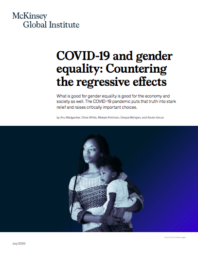
Covid-19 and gender equality: Countering the regressive effects

Given trends we have observed over the past few months, in a gender-regressive scenario in which no action is taken to counter these effects, we estimate that global GDP growth could be $1 trillion lower in 2030 than it would be if women’s unemployment simply tracked that of men in each sector. (It is important to note that the impact could be more severe than the one we have modeled here if factors such as increased childcare burdens, attitudinal bias, a slower recovery, or reduced public and private spending on services such as education or childcare make women leave the labor market permanently.) Conversely, taking action now to advance gender equality could be valuable, adding $13 trillion to global GDP in 2030 compared with the gender-regressive scenario. A middle path—taking action only after the crisis has subsided rather than now—would reduce the potential opportunity by more than $5 trillion. The cost of that delay amounts to three-fourths of the total global GDP we could potentially lose to COVID-19 this year. Even before the coronavirus, our 15 indicators showed that tangible progress toward gender parity had been uneven and that large gender gaps remained across the world. Now, without intervention to address the disproportionate impact of COVID-19 on women, there’s a risk that progress could go into reverse. This would not just set back the cause of gender equality but also hold back the global economy. Conversely, taking steps to redress the balance now could improve social and economic outcomes for millions of women globally and help boost economic growth.
- Issues:
- Demographics, Economics
- Region:
- Global
- Year Published:
- 2020
- Authors:
- Mekala Krishnan, Olivia White, Deepa Mahajan, Xavier Azcue
- Institutions:
- McKinsey Global Institute, McKinsey & Company

